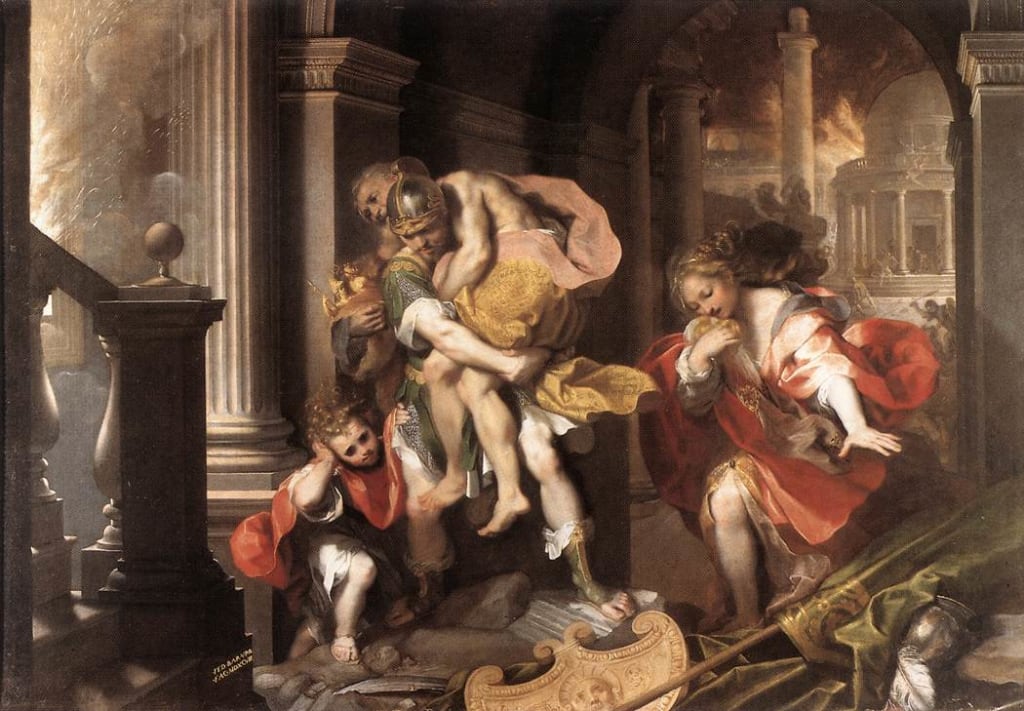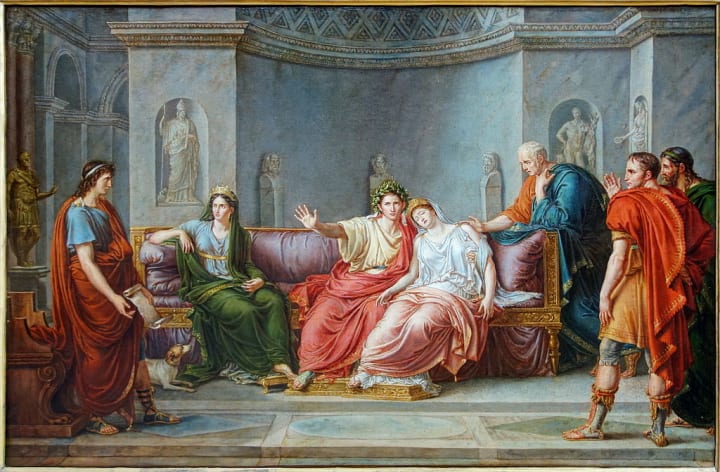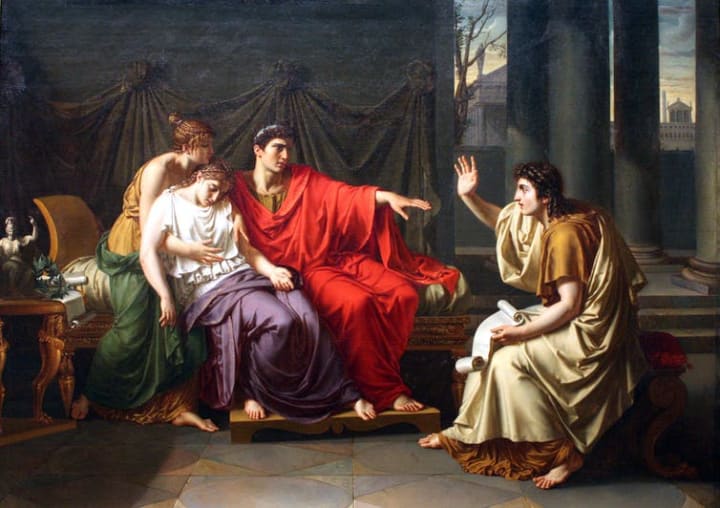"The Aeneid" by Virgil
A Reading Experience (Pt. 25)

It’s been about nine or ten years since I first read Virgil’s “Aeneid” and there’s a strange reason behind why I even read it in the first place. I found it in a beautiful copy at a bookstore. It was clothbound and patterned. The reason I actually picked it up was because I was watching a strange cartoon on the internet the previous day that was all to do with romans, I can’t remember exactly what it was but when I opened “The Aeneid”, the cartoons reminded me of the ones from the video - just drawn a billion times better. My first reading experience of “The Aeneid” was actually really strange because I remember trying to bullet point exactly what was happening all the way through the book and yet, I didn’t really understand what happened at the end because it didn’t really end at all. This book really ended up changing my opinion on the possibilities for poetry. It was a whole new poem with a great amount of drama. It was an epic in every sense of the word and I loved it so much that I ended up reading it every year since. I studied it for my undergraduate dissertation and I even got some people in to it online as well. It’s a brilliant poem with some great characters and history.
My favourite character in the book is Dido, Queen of Carthage. Dido is the woman who falls in love with Aeneas as he passes through Carthage on his great journey. She tries to persuade Aeneas to stay and yet he doesn’t listen to her. He takes off, leaving her behind and she kills herself in response. The next time Aeneas will see her is when she’s stoically standing there ignoring him in the underworld. The one thing that makes Dido, Queen of Carthage great is her romanticism. She can be imagined as similar to the 18th Century monarchs of Europe. The long, flowing dresses and the massive hair that I have always imagined her to have could really be a part of her. She talks in the most contemplative way and feels everything times a million. In the time that she’s in the poem, she manages to go through almost every single extreme emotion. Yet, the main fault that Dido has is her inability to turn off her emotions around people. She has this strange show of emotion towards Aeneas in which she appears vulnerable and almost overly innocent. This not only makes her appear weak, but it also makes others think that she is not as strong as other characters. Thus, she is taken advantage of and thus, she goes on feeling too much. When Aeneas leaves her - she feels way too much all at once. This overwhelming state begets a bad reaction and she kills herself as a result. Dido seems to represent the catharsis of the book and when Aeneas is on his journey, we have the end of the Trojan War. This ending to the war releases all the anger Aeneas once and and now, the point at which he is leaving Dido, he releases all his positive emotion such as: being in love and being vulnerable to a woman. Dido represents not only this catharsis, but she also represents another turn in the narrative and in Aeneas’s journey. She is such a heartbreaking and tragic character, I believe that some parts of her may have inspired the way in which Shakespeare wrote Ophelia, Lady Macbeth, Calphurnia, Cleopatra and many more of his suicidal females in his plays.

A key theme I noticed in this text and I really enjoyed analysing was anger and rage. I love this feeling because its also prominent in The Iliad. Actually, if you read it in its original language, the first word of The Iliad is ‘wrath’ or ‘rage’ when transliterated. In “The Aeneid” the theme of rage and wrath brews up from the very beginning in which we see that great storm in the first few pages. It is one of the things that represents the rage of Aeneas against those who stand against him through the book. We have the rage of Romulus against his brother that causes one to kill the other. All this anger boils up over the book and pushes you towards the end of the poem in which there is a big, big fight. It brings the emotion up so well that you can actually feel your heart pounding against your chest at top speed. Aeneas plays out the theme himself yes, but so do Romulus and Remus, so does the fire of Troy and the deaths of people Aeneas knows. This theme is used, I believe, for opening and closing the text because it imitates the way in which the Iliad is opened and closed and therefore, we see the connection to Homer. In The Iliad, it opens with the rage of Achilles and closes with Achilles raging by dragging Hector’s dead body around in the penultimate book. However, because “The Aeneid” isn’t finished, we can presume that there may be some aspect of copying the wrath into the penultimate scene of Aeneas’s chapter in which he kills another character. It really impacts the way you read the book because it is one of the main ways in which the Aeneid thematically links to the Iliad. Thus, making the links not only between Virgil and Homer, but between the genealogy of the Ancient Romans and the Ancient Greeks.
This book means so much to me because of the fact I have read it so many times. But also because of the fact I really identified with the overwhelming emotions displayed mostly by Dido. Especially at the time I was reading it. I was young and wanted to know more about the extensive emotion that was to echo throughout my womanhood. It may have not been the best book to teach me them, but it sure did teach me not to get overwhelmed so badly that we kill ourselves. It is an irrationality that just makes Dido more of an extreme character and thus, makes me love her even more. My latter reading experiences were impacted so much because I went straight to Thomas Nashe and Christopher Marlowe’s “Dido, Queen of Carthage”. Again, I was surprised by the overwhelming emotion she put out. It was just beautiful, it is such an important part of her character. Through my re-readings of “The Aeneid” I have discovered that Dido is a far more complex character than a lot of people give her credit for. She is a character with so much identity and so much of her own, and plus - she is a Queen as well. She is loved by Gods such as Hera and when she dies, it sends a wrath from the Gods down to Aeneas. The best thing about the book will always be Dido’s suicide scene. It’s just so incredibly heart-breaking and is one of the most emotional things you’ll ever read in poetry.

I think far more people should give this book a chance even though at first it may be slightly difficult to read at first, a good thing about it is that it isn’t slow. You get into it straight away. Many people actually read this book because they’ve read The Iliad and it really feels like another side to that story. That is a great reason because it’s always nice to see what other people are saying about the same war. When I re-read the book, this is exactly what I want to pay attention to as well. I want to have a look at Aeneas’s position in the Trojan War in the Iliad compared to The Aeneid and see how he is portrayed in both. Comparing them will be a lot of fun as I can imagine. So please give my favourite epic poem a chance today. It’s one of the most beautiful poems ever written by a mile.
About the Creator
Annie Kapur
200K+ Reads on Vocal.
English Lecturer
🎓Literature & Writing (B.A)
🎓Film & Writing (M.A)
🎓Secondary English Education (PgDipEd) (QTS)
📍Birmingham, UK






Comments
There are no comments for this story
Be the first to respond and start the conversation.